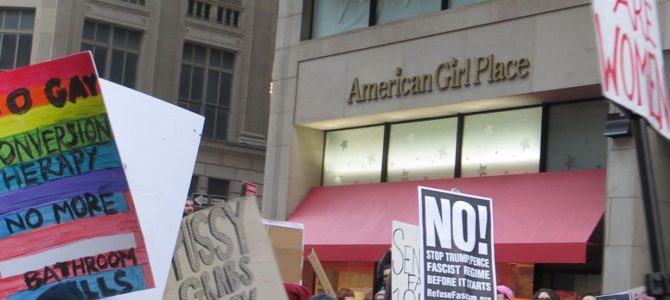Yesterday, under the guise of prohibiting discrimination against LGBT individuals, the American Civil Liberties Union held a conference call with a panel of “experts and activists” to preview upcoming state legislative and ballot measures. Over the course of the 30-minute update, the ACLU highlighted the main areas of concern from their perspective.
As Rose Saxe, the ACLU LGBT and HIV Project senior staff attorney explained, ACLU priorities include a number of bills seeking to expand religious exemptions, such as West Virginia and Iowa’s proposed Religious Freedom Restoration Act laws. Saxe also condemned the provisions put forth in Oklahoma, Colorado, and other states that would allow child-placement agencies to keep foster-care and adoption placement decisions consistent with the organization’s religious beliefs.
The bulk of the conference call, though, focused on what the ACLU branded anti-trans legislation. Chase Strangio, a LGBT & HIV Project staff attorney, explained that most of these “anti-trans” bills focus on protecting single-sex facilities. Strangio noted that in April residents in Anchorage, Alaska will vote on one such measure—Proposition 1—and in November, a state-wide ballot measure will be before Massachusetts voters.
The ACLU then welcomed Lillian Lennon, a field organizer for Fair Anchorage and an opponent of Proposition 1. Lennon framed the proposition to preserve sex-specific facilities as an attempt to “legalize discrimination against trans people.” However, Proposition 1, and other similar single-sex facility laws do not “legalize discrimination.”
Rather, this citizen-introduced initiative, if adopted, would do two things: First, the law would require government-owned or -operated “multiple occupancy” restrooms and changing rooms, such as locker rooms or showers, to be single-sex. A municipality could, however, offer unisex single-occupancy restrooms and changing rooms. Second, Proposition 1 would allow private businesses to decide whether to maintain single-sex changing rooms and restrooms. In 2015 the Anchorage Assembly outlawed this by mandating that public accommodations open restrooms and changing rooms to members of the opposite sex based on their professed gender identity.
Your Complaint Is with Nature, Not the State
Proposition 1 does not treat transgender individuals any differently than it does other individuals. Access to “multiple occupancy” facilities is determined by sex for all individuals, whether transgender or not. There is no discrimination. Lennon’s real complaint, disguised behind the false flag of “discrimination,” is that Proposition 1 would not treat him differently than it does other men by allowing him access to female-designated locker rooms and restrooms because he is transgender.
In discussing the Anchorage proposal, Lennon also inadvertently exposed the extremism underlying activists’ opposition to Proposition 1. He complained the law, if passed, would “redefining” sex as “immutable by birth.” Proposition 1 does define sex “as an individual’s ‘immutable biological condition of being male or female,’ as determined by ‘anatomy and genetics at the time of birth.’” But that is not a redefinition of sex. That is what sex is.
Additionally, Lennon let slip the validity of the law’s justifications: safety. While maintaining “this proposition would not increase safety, in fact it could quite possibly make people less safe,” not a minute later, Lennon argued that because he lives as a woman, putting him “in a men’s restroom would put [him] at a serious risk for harm.” That is exactly why women do not want men in their locker rooms and restrooms, whether the men claim to be women or not.
Residents will vote on Proposition 1 by mail, with ballots mailed out in less than a month. Returned ballots must be postmarked by April 3. While the impact of this vote will be limited to the municipality of Anchorage, the outcome will be telling: When given the choice, will the populace hold fast against a trans agenda that demands society affirm a falsehood, or have activists already succeeded in redefining sex so that the citizenry sees male as female?









